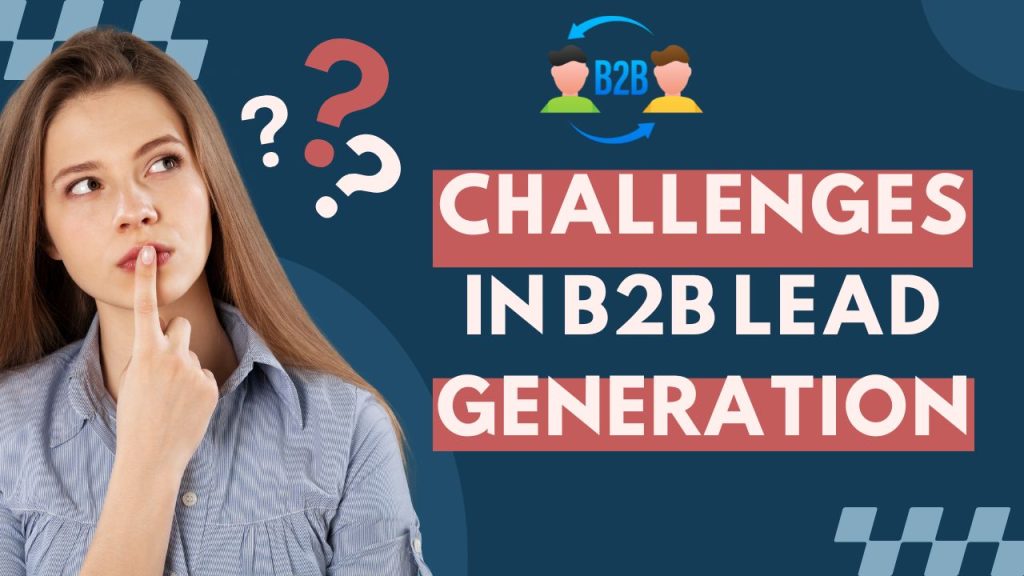Lead generation is the method of attracting and pledging your prey audience to the moment when they like to offer you their details. This method works by pushing targeted traffic to your website, grabbing visitor details, and stimulating those who match your consumer personas. This is the foremost step in creating a significant association with a potential customer. Some common methods include job applications, blog posts, vouchers, live events, and online content.
Lead Generation

Lead generation is a paramount part of running a triumphant business. Our blog is concentrated on delivering helpful direction and tactics for developing and facilitating leads, as well as dwelling up to date on the most recent movements and technologies in the industry. Here you can contact (919) 752 4551 professinals of our team.
Whether you are a newbie or have years of knowledge, our blog presents valuable data to help improve your lead-generation techniques. From comprehending the target audience to executing effective marketing methods, we protect a wide range of issues to assist you best in lead generation. Stay tuned to our blog for all the most delinquent insights and tips to enhance your lead-generation actions.
B2B Lead Generation

B2B (Business-to-Business) lead generation is the procedure of determining and drawing businesses to buy products and assistance delivered by another business. Unlike B2C (Business-to-Consumer) lead generation, which targets individual customers, B2B lead generation concentrates on businesses, associations, or specialists as the target audience. The purpose is to create relationships with business owners, managers, and decision-makers to deliver custom explanations that meet their company’s requirements.
Importance of B2B Lead Generation
B2B lead generation is important for the development and sustainability of any lead generation company. It assists in determining potential customers, fostering connections, and eventually converting opportunities into clients. This approach not only forces sales but also improves brand attention and credibility in the market.
Effective B2B lead generation techniques can seriously diminish the sales cycle and improve the return on investment (ROI).
The Role of Content in B2B Lead Generation
Creating Valuable Content
Making valuable content is the cornerstone of useful B2B lead generation. High-quality content can vary from white writings and case studies to infographics and premier videos. The purpose is to attract possible customers by showing something appropriate and reasonable in interaction for their contact details. This process not only charges leads but also assists in segmenting them based on their appeals and requirements.
Content Distribution Channels
To increase the effect of your content, it’s important to spread it via suitable channels. Some useful channels for B2B lead generation comprise:
- Content marketing
- Email marketing
- Social media
- Webinars/webcasts
- Search Engine Optimization SEO
- Paid search
Individually channel has its special benefits and can be utilized to target various steps of the buyer’s expedition.
Measuring Content Effectiveness
Calculating the usefulness of your content is important for purifying your lead generation strategy. Key metrics to track include:
| Metric | Description |
| Conversion Rate | The ratio of visitors who take a preferred action |
| Engagement Rate | The grade of interaction with your content |
| Lead Quality | The potential worth of the leads developed |
By examining these metrics, you can determine which types of content and distribution channels are most useful in conducting high-quality leads.
Content is the typical denominator throughout the lead generation funnel. Whether it’s a blog, an electronic book, or a case study, your content will be the tool to turn your lead into a prospect and eventually into a customer.
Automating B2B Lead Generation
Advantages of Automation
Automating B2B lead generation can greatly improve efficiency and precision. Automation devices can endure redundant tasks, permitting your team to concentrate on more strategic actions. Further, automation guarantees that no information drops through the gaps, enhancing overall lead control.
Popular Automation Tools
Several tools are obtainable to assist automate B2B lead generation. Some of the most famous include:
- HubSpot
- Marketo
- Pardot
- ActiveCampaign
These devices offer elements like email automation, lead scoring, and analytics to simplify your lead generation strategy.
Implementing Automation in Your Strategy
To successfully implement automation in your B2B lead generation strategy, follow these steps:
- Identify repetitive tasks that can be automated.
- Select the proper automation tools that suit your requirements.
- Combine these tools with your living CRM and marketing platforms.
- Observe and modify your automation workflows to guarantee optimal implementation.
Implementing automation can change your lead generation actions, making them more efficient and useful.
Challenges in B2B Lead Generation

Common Obstacles
B2B lead generation is important for business victory, but it comes with its collection of challenges. One of the considerable meaningful barriers is recognizing and targeting the right audience. Without a precise knowledge of your target market, your actions can be misdirected, leading to wasted aid and poor outcomes. Further, seizing high-quality leads is usually challenging due to the increasing unwillingness of candidates to transfer their secret knowledge.
Overcoming Challenges
To overpower these challenges, companies must assume a strategic direction:
- Define Your Target Audience: Make clear buyer personas to ensure your marketing measures are concentrated on the right people.
- Optimize Your Content: Assure your content is useful and appropriate to your audience to motivate engagement and knowledge sharing.
- Leverage Technology: Operate CRM systems and marketing automation tools to streamline your lead generation technique and enhance efficiency.
Measuring Success in B2B Lead Generation
Key Metrics to Track
To estimate the success of your B2B lead generation actions, it’s important to track both the amount and quality of leads. Lead quantity guides the number of leads caused, while lead quality concentrates on the possibility of those leads transforming into customers. Standard metrics contain:
- The number of leads generated
- Conversion rate
- Cost per lead
- Lead scoring
Tools for Measurement
Different tools can assist you in calculating these metrics. CRM systems, marketing automation platforms, and lead-scoring software are generally used. This means not only tracking metrics but also supplying an understanding of the persuasiveness of your lead-generation techniques.
Interpreting Data
Examining the data collected from these instruments is essential for distilling your lead generation techniques. Examine for directions and ways that show which tactics are performing and which require modification. Data-driven decisions can seriously improve your lead-generation actions.
Invariably analyzing and analyzing your lead generation data confirms that you are always optimizing your systems for better outcomes.
Importance of Lead Generation
Lead generation is an important part of any prosperous marketing movement. It permits you to draw and recognize potential buyers who are vigorously examining for products or services that your business proposes. By targeting these individuals, you can make a much more useful advertising system that produces increased conversion rates and improved ROI. This is especially important in b2b lead generation where the sales cycles are more extended and more complicated.
Lead Generation services
Lead generation services are parties or platforms that specialize in supporting businesses to discover and entice potential buyers, understood as leads. These benefits employ different methods and techniques to recognize, confront, and prepare leads, eventually providing them to their clients.
Here’s how lead generation services generally work:
- Target Audience Identification: Learning who your exemplary customers are.
- Lead Capture: Gathering details from potential leaders through different channels.
- Lead Nurturing: Confronting with leads via personalized contact to create connections.
- Lead Qualification: Evaluating the possibility of leads to evolve consumers.
- Conversion: Shifting qualified leads into spending consumers.
Demand generation vs lead generation is a familiar subject of discussion, where demand generation concentrates on making awareness and attraction, while lead generation seeks to reverse that appeal into actionable information.
BEST LEAD GENERATION SERVICES FOR REALTORS

For realtors, effective lead generation services concentrate on enticing and engaging potential home consumers and vendors. The most promising lead-generation services for realtors usually integrate digital marketing, personalized outreach, and real estate-specific platforms. Here are some of the highest lead generation services for realtors:
Zillow Premier Agent
- Overview: Zillow is one of the considerable prevalent real estate websites. As a Premier Agent, realtors get whole leads and their contact information is shown on listings in their target locations.
- Benefits: High magnitude of traffic, targeted leads, and brand visibility.
Realtor.com Connections Plus
- Overview: Realtor.com is another top real estate website. Connections Plus delivers realtors’ lead generation services by combining them with coming buyers and vendors in their selected markets.
- Benefits: Direct relation to active customers and dealers, thorough lead understandings, and lead nurturing tools.
BoldLeads
- Overview: BoldLeads delivers automated lead generation via targeted ads and landing pages. It concentrates on both consumer and dealer leads.
- Benefits: Automatic follow-up procedures, customizable landing pages, and entire regions.
Market Leader
- Overview: Market Leader delivers wide lead generation and marketing automation services. They deliver upmarket leads and CRM tools to organize and promote those leads.
- Benefits: Whole leads, integrated CRM, and marketing automation.
Redfin Partner Program
- Overview: Redfin partners with local dealers and delivers them with leads in interaction for a referral fee upon thriving finale.
- Benefits: Key to Redfin’s actual user base, no upfront fees, and only pay for prosperous marketing.
Boom Town
- Overview: BoomTown delivers a whole suite of real estate marketing agencies including lead generation, CRM, and marketing automation.
- Benefits: Integrated platform, thorough lead insights, and strong CRM capacities.
Offrs.com
- Overview: Offrs.com utilizes predictive analytics to determine homeowners who are possible to deal with. They supply exclusive leads founded on these forecasts.
- Benefits: Predictive analytics, complete leads, and targeted marketing movements.
Real Geeks
- Overview: Real Geeks delivers lead generation via custom IDX websites and targeted marketing movements, along with a CRM for managing authorities.
- Benefits: Customizable websites, integrated CRM, and complete lead control.
Ylopo
- Overview: Ylopo concentrates on digital marketing to develop leads through developed Facebook and Google ad campaigns, along with IDX websites.
- Benefits: Progressive digital marketing techniques, active lead capture, and extensive analytics.
Homesnap Pro
- Overview: Homesnap Pro associates realtors with potential leads by leveraging a mobile app and a web forum. It also supplies tools for working and promoting these leads.
- Benefits: Mobile-friendly, real-time lead information, and integration with MLS data.
Each of these services presents special characteristics and benefits, so realtors should select the one that best aligns with their precise requirements, market, and budget. Effective usage of these lead generation services can greatly enhance a realtor’s capacity to attach with potential customers and complete more sales.
How Lead Generation Fits into the Sales Funnel
For many corporations, lead generation is the initial phase of the sales funnel. It applies to capturing visitors’ reference information through additional channels, such as web documents on landing pages. This information is then utilized to enable the leads via various phases of the funnel until they are willing to complete a purchase.
The difference between demand generation and lead generation is also necessary here, as demand generation concentrates on building understanding and interest, while lead generation seeks to transform that interest into actionable leads.
Types of Lead Generation
Inbound Lead Generation
Inbound lead generation concentrates on drawing potential customers to your business via different online channels. Producing valuable content such as blog posts, eBooks, and webinars can attract competitors in. This approach relies laboriously on organic search traffic, social media engagement, and SEO techniques.
Outbound Lead Generation
Outbound lead generation concerns proactively running out to potential consumers. This can have cold calling, direct mail, and email movements. The objective is to get your details straight in front of competitors who may not be vigorously searching for your product or service.
Hybrid Approaches
A hybrid approach blends both inbound and outbound techniques to maximize lead generation actions. For instance, you might utilize outbound ways to push traffic to a high-value piece of content, thereby combining the strengths of both techniques. This can present a proportional method to provide a constant flow of leads.
Benefits of Lead Generation
Increased Sales Opportunities
Lead generation lets businesses draw and recognize potential buyers who are actively examining products or services that your business recommends. By targeting these individuals, you can make a much more practical advertising method that produces increased conversion rates and improved ROI.
Improved Targeting and Personalization
With modern lead generation strategies, companies can accumulate useful knowledge about potential customers. This data helps businesses to tailor trade methods and sales angles to compare prospect demands, resulting in more personalized and useful communication.
Enhanced Customer Relationships
Lead generation is the foremost step in creating a significant relationship with a potential client. By nurturing leads via targeted content and engagement, companies can boost confidence and commitment, eventually directing to long-term customer connections.
Lead generation is an important part of any prosperous marketing campaign. It permits you to draw and recognize potential consumers, making chances for improved sales and enhanced customer connections.
The Lead Generation Process
Attracting Prospects
The lead generation process begins with attracting prospects to your business. This involves understanding your target audience’s needs, preferences, and challenges. Effective attraction strategies include content marketing, social media engagement, and SEO optimization. The goal is to drive targeted traffic to your website or landing pages.
Capturing Lead Information
Once you have attracted prospects, the next step is to capture their information. This is typically done through web forms, landing pages, or call-to-action buttons. It’s crucial to offer something of value in exchange for their contact details, such as a free eBook, a discount, or access to exclusive content. Capturing lead information is essential for building a database of potential customers.
Nurturing Leads
After capturing lead information, the focus shifts to nurturing these leads. This involves engaging with them through personalized email campaigns, targeted content, and regular follow-ups. The aim is to build a relationship and guide them through the sales funnel until they are ready to make a purchase. Nurturing leads effectively can significantly increase conversion rates.
The lead generation process is a continuous cycle of attracting, capturing, and nurturing prospects to convert them into loyal customers.
Effective Lead Generation Strategies
Content Marketing
Content marketing is a strong tool in the arsenal of lead-generation methods. By making valuable, appropriate, and constant content, businesses can draw and have a distinctly determined audience. High-quality content not only causes traffic but also makes trust and management in your slot. Kinds of content that can be utilized include blog posts, whitepapers, eBooks, and videos.
Social Media Marketing
Social media platforms present a special chance to contend with possible leads. By communicating fascinating content and interacting with supporters, businesses can create connections and push traffic to their websites. Social media marketing permits targeted advertisement, making it more comfortable to get specific demographics and interests.
Email Marketing
Email marketing is one of the most influential lead-generation techniques. By sending personalized and appropriate emails, businesses can boost leads and drive them via the sales funnel. This process applies to segmenting your email list, preparing effective subject lines, and delivering useful content that enables recipients to bring action.
Effective lead-generation strategies need a mix of originality, consistency, and data-driven decision-making. By leveraging these techniques, businesses can draw, grip, and correct possible leads into faithful clients.
Challenges in Lead Generation
Identifying Quality Leads
One of the most important challenges in lead generation is recognizing quality leads. Low-quality leads can squander useful time and resources, making it hard for sales teams to transform them into buyers. To confound this, businesses ought to design a robust lead-scoring method that allows prioritizing leads based on their likelihood to transform.
Maintaining Engagement
Maintaining leads employed throughout the sales funnel is another everyday challenge. Many leads fail to interest or become unresponsive over time. To support engagement, it’s important to deliver relevant and valuable content at each step of the buyer’s expedition. This can contain personalized emails, targeted content, and opportunely follow-ups.
Measuring Success
Estimating the success of lead generation struggles can be problematic. Without appropriate metrics and analytics, it’s difficult to resolve which approaches are performing and which are not. Executing tools like CRM systems and marketing automation platforms can support tracking key performance indicators (KPIs) and deliver insights into the significance of your lead generation movements.
Invariably reviewing and changing your lead generation techniques based on data-driven understandings can greatly enhance your outcomes.
Tools for Lead Generation
Lead Generation Software
Lead generation software allows you to monitor relations, follow them, and manage related data. Other lead generation software presents various abilities, but what you require is the capability to assemble details from any document on your website, social media, or chatbots; reduce this data on one forum; and make points of attention such as pop-ups and hello bars that support turn website sightseers into leads.
CRM Systems
Customer Relationship Management (CRM) systems are necessary for collecting and interpreting customer relations and data throughout the consumer lifecycle. A good CRM system can support you enhance business connections, streamline operations, and improve profitability. By combining CRM with your lead generation tools, you can guarantee that all your lead data is collected and readily available.
Marketing Automation Tools
Marketing automation tools are created to automate marketing schemes and workflows. These tools can assist you in organizing numerous marketing channels, automating repetitive tasks, and following the implementation of your campaigns. Using marketing automation tools in a meeting with lead generation tools can assist you nurture leads more virtually and alter them into buyers.
Financing in the right lead generation tools can greatly improve your capability to draw, capture, and nurture leads, eventually driving more sales and development for your business.
Tips for Successful Lead Generation
Optimizing Landing Pages
A well-optimized landing page is important for transforming visitors into leaders. Confirm your landing page is straightforward, brief, and visually attractive. Use effective headlines, interesting visuals, and a powerful call to action. A/B testing additional elements can assist in identifying what performs best.
Using Calls to Action
Calls to action (CTAs) are important for guiding candidates through the lead generation strategy. Make certain your CTAs are well-known and convey the next step. Utilize action-oriented language and build a sense of quickness to facilitate immediate reaction.
Leveraging Analytics
Analytics deliver valuable understanding into the undertaking of your lead generation actions. Follow key metrics such as conversion rates, click-through rates, and bounce rates. Utilize this data to purify your methods and enhance overall significance.
By continually observing and changing your lead generation tactics, you can provide sustained victory and change.
Lead Scoring and Management
What is Lead Scoring?
Lead scoring is an influential model that enables sales and marketing departments to identify which opportunities are potentially most useful to the company and its existing sales funnel. It applies a quantitative form of assigning a numerical “score” to a lead. This allows the company to determine whether a connection is useful for their pipeline and permits them to prioritize information and assign resources consequently.
Implementing Lead Scoring
This is a method where you allocate scores to your leads established on their manners, concentration, and fit with your perfect customer profile. There are many lead-scoring techniques:
- Demographic scoring: Set points based on demographic information, such as job label, industry, and company scope.
- Behavioral scoring: Score leads established on their manners, such as website visits, email opens, content downloads, and event attendance.
- Engagement scoring: Calculate the lead’s level of attention to your brand across different channels.
- Fit scoring: Consider how nicely the lead matches your ideal customer profile (ICP).
Managing Leads Through the Funnel
Lead generation is usually paired with lead management to drive leads via the buying funnel. This mixture of actions is directed as pipeline marketing, which is frequently split into a marketing and a sales pipeline.
Effective lead management ensures that leads are encouraged and directed through the funnel, improving the probability of transformation.
Future Trends in Lead Generation
AI and Machine Learning
Artificial Intelligence (AI) and Machine Learning (ML) are revolutionizing lead generation by automating and optimizing functions. AI can examine extensive amounts of data to determine practices and foreshadow which leads are most probably to transform. This permits more efficient targeting and personalized commerce techniques.
Personalization at Scale
With advances in technology, personalization is no longer restricted to small-scale actions. Companies can now offer favorably personalized adventures to a large audience. This contains tailored content, customized email movements, and personalized product suggestions, all desired to boost engagement and transformation speeds.
Data Privacy Considerations
As data privacy laws become more stringent, companies must adjust their lead generation systems to comply with laws like GDPR and CCPA. These concerns are evident about data collection methods, receiving explicit permission from users, and providing data guards. Failure to concede can result in hard fines and harm to a company’s prestige.
The future of lead generation lies in leveraging progressive technologies while keeping a strong emphasis on data privacy and personalization. Companies that can counterbalance these details will be well-positioned for conquest.
Conclusion
Lead generation is an essential element of the sales funnel, particularly for B2B companies where the sales cycle is more extended and more complicated. By virtually catching and nurturing leads, businesses can assemble significant connections with potential buyers, eventually driving higher transformation rates and improved ROI. Whether through inbound or outbound methods, the key to triumphant lead generation lies in comprehending your target audience and leveraging the suitable tools and strategies to confront them. As the landscape of lead generation persists to develop, remaining updated with the most delinquent trends and best techniques will guarantee that your business stays competitive and talented in turning opportunities into loyal consumers.
Frequently Asked Questions
What is lead generation?
Lead generation is the method of attracting and pledging your target audience to the point where they like to offer you their knowledge. This method works by pushing targeted traffic to your website, grabbing visitor details, and nurturing those who match your consumer personas.
Why is lead generation important?
Lead generation is an important part of any prosperous marketing campaign. It permits you to draw and recognize potential customers who are vigorously looking for products or benefits that your business proposes. By targeting these individuals, you can make a much more useful advertising system that produces higher transformation rates and improved ROI.
How do I generate leads?
You can develop leads through diverse modes such as job applications, blog posts, coupons, live events, and online content. These lead generators help draw potential buyers and conduct them toward your suggestions.
What are the types of lead generation?
Lead generation mainly consists of two types—inbound and outbound. Inbound lead generation draws prospects to you through marketing measures like content, webinars, and surveys. Outbound lead generation involves running out to potential clients through strategies like cold calling and email campaigns.
What sorts of businesses benefit from lead generation services?
All kinds of businesses can help from lead generation services, including:
- Real estate sellers and brokers
- Economic services
- B2B companies
- E-commerce marts
- Healthcare providers
- Academic organizations
- Technology companies
What are the advantages of utilizing a lead generation service?
Uses contain:
- Key to expertise and developed tools
- Time and help savings
- More increased quality leads
- Enhanced targeting and personalization
- Improved efficiency in the sales revolution
- Scalability and adaptability to market modifications
What tools can help with lead generation?
There are different tools available for lead generation, including lead generation software, CRM systems, and marketing automation tools. These tools help you monitor interactions, track data, and engage with potential leads more effectively.
Are lead generation services costly?
The price of lead generation services ranges widely depending on aspects like the industry, target audience, and service scope. Some services cost per lead, while others have subscription or performance-based pricing standards. It’s necessary to consider the potential return on investment when evaluating the expense.
